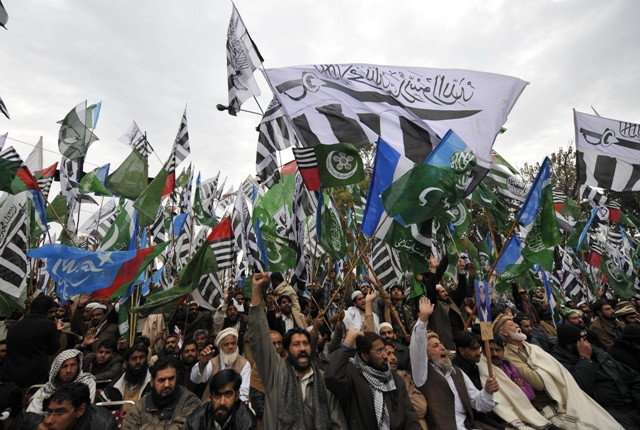The defence of Pakistan
DPC has the distinction of containing two big jihadi outfits banned internationally, but not banned inside Pakistan.

The DPC is focusing on the drones, the threat of resumed Nato supplies through the Pakistani route, the appearance of a number of draft resolutions at the US House of Representatives about Balochistan (at least, one of them defending the right of self-determination of the Baloch), and the award of the Most-Favoured Nation status by Pakistan to India. The DPC strongmen have taken a firm position on how their warriors will attack the supply convoys if they are resumed. The DPC has the distinction of containing two big formerly jihadi outfits banned internationally, but not banned inside Pakistan, plus the newly-raised and renamed organisation by an old companion of Osama bin Laden, Maulana Fazlur Rehman Khaleel, whose safe house in Islamabad once served as bin Laden’s post office.
At an earlier show of strength in Multan, the DPC also featured Malik Ishaq of the banned Lashkar-e-Jhangvi, who has been accused of involvement in dozens of sectarian murders. At first, one of the leaders of the DPC, ex-ISI chief General (retd) Hamid Gul denied that he was present at the rally, but later apologised in the face of solid evidence. Another individual given to inciting sectarian hatred, Kohat’s Javed Ibrahim Paracha, known as al Qaeda’s lawyer, has been appearing in the DPC demonstrations. No one is bothered about the fact that terrorists are featuring big in them. The ISI should be bothered, too, because its cause against America is being promoted by the DPC in the company of these outlaws, but some analyses of the DPC deployment tend to see it as a concealed response of the establishment against the barrage of criticism being levelled at it.
At a recent seminar staged in Peshawar under the auspices of the Centre for Discussions and Solutions, an advocacy organisation created by Qazi Hussain Ahmed of the Jamaat-e-Islami, two ex-ISI chiefs made their appearance: the usual fixture General (retd) Hamid Gul, who has emerged as a leader of the jihadis whom he once handled, was accompanied by General (retd) Asad Durrani. Why should the ex-ISI chiefs join the challenge to the sitting government? Mr Gul is known to be aggressive in his championship of all causes anti-American, but Mr Durrani could be entering the fold of religious rebellion because the Supreme Court is about to hear a case against fixing the 1990 elections with illegal funds in which he is named. Since there is a strong odour of establishment behind the DPC onslaught, it is quite possible that certain strong elements within it are signalling their own preferred option in foreign policy against America and India. The world outside sees clearly what most in Pakistan may not be able to see or may prefer to ignore for a number of reasons. Pakistan is losing its grip in the face of forces it once unleashed to advance its foreign policy. The quicker it realises this and takes corrective action, the better for it.
Published in The Express Tribune, February 21st, 2012.















COMMENTS
Comments are moderated and generally will be posted if they are on-topic and not abusive.
For more information, please see our Comments FAQ